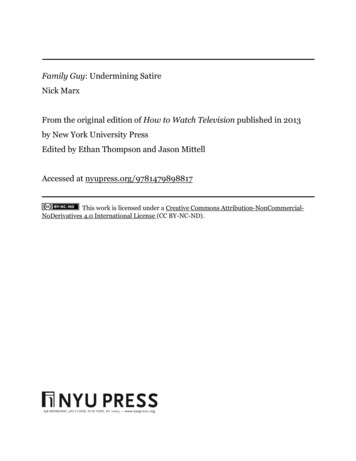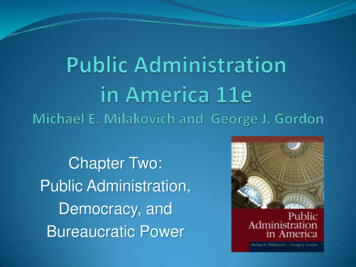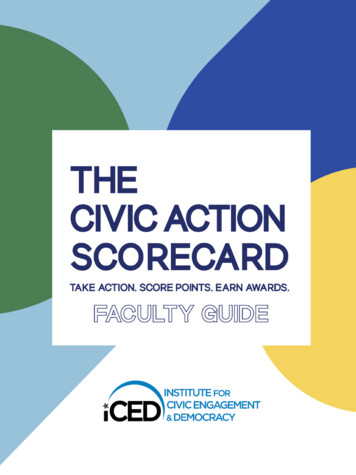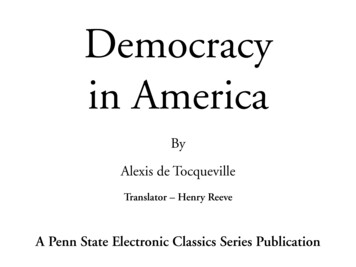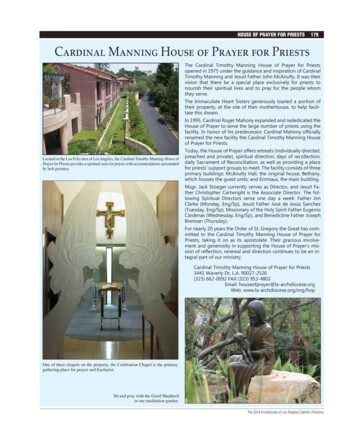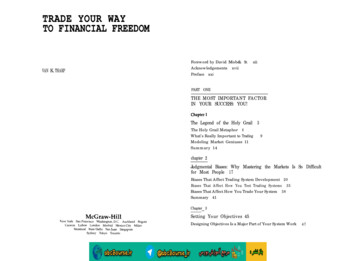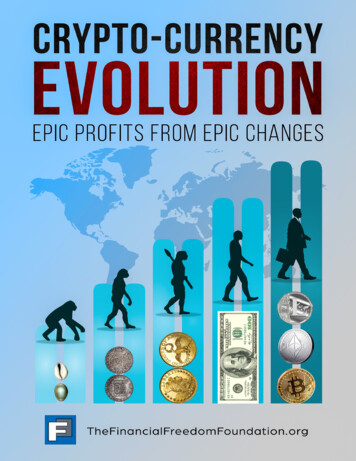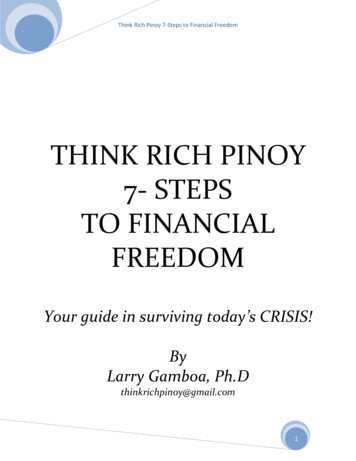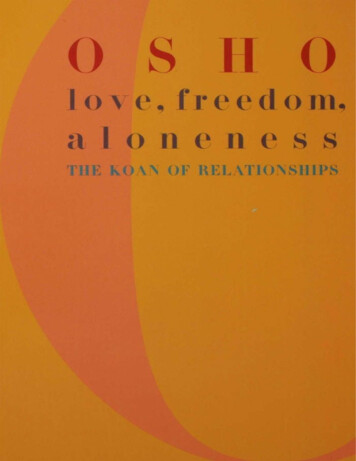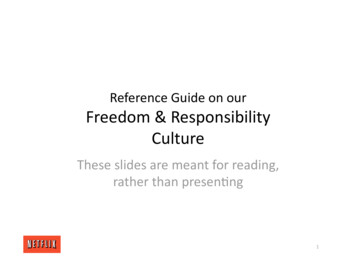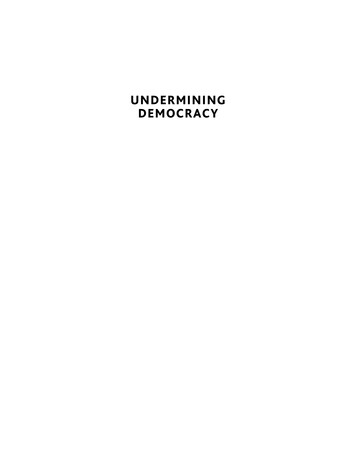
Transcription
underminingdemocracy
21st Century AuthoritariansFreedom HouseRadio Free Europe/Radio LibertyRadio Free AsiaJUNE 2009
Copyright of this publication is held by Freedom House. You may not copy, reproduce,republish or circulate in anyway the content from this publication except for your ownpersonal and noncommercial use. Any other use requires the prior written permission ofFreedom House, 1301 Connecticut Ave NW, Washington, DC 20036.Published by Freedom House in association with Radio Free Europe/Radio Liberty andRadio Free Asia. Freedom House June 2009.
contentsAcknowledgements and Study Team . . . . . . . . . . . . . . . . . . . . . . . . . . . . . . . . . . . . . . . . . . viiAuthors . . . . . . . . . . . . . . . . . . . . . . . . . . . . . . . . . . . . . . . . . . . . . . . . . . . . . . . . . . . . . . . . . . . .ixOverview Essay“Undermining Democracy: Strategies and Methods of 21st CenturyAuthoritarians”. . . . . 1Country StudiesChina: Resilient, Sophisticated Authoritarianism . . . . . . . . . . . . . . . . . . . . . . . . . . . . . . . 13Iran: Clerical Authoritarianism . . . . . . . . . . . . . . . . . . . . . . . . . . . . . . . . . . . . . . . . . . . . . 29Pakistan: Semi-Authoritarian, Semi-Failed State . . . . . . . . . . . . . . . . . . . . . . . . . . . . . . . 39Russia: Selective Capitalism and Kleptocracy . . . . . . . . . . . . . . . . . . . . . . . . . . . . . . . . . 49Venezuela: Petro-Politics and the Promotion of Disorder . . . . . . . . . . . . . . . . . . . . . . . . . 65v
acknowledgements and study teamIn producing Undermining Democracy: 21st Century Authoritarians, Freedom House, RadioFree Europe/Radio Liberty and Radio Free Asia undertook an 18-month strategic researcheffort to analyze a set of complex and geopolitically important states. The final product,whose contents are the sole responsibility of the three organizations that oversaw its publication, would not have been possible without the contributions of an extensive number ofpeople who offered their time, expertise and intellect to this initiative. The organizers of thisproject therefore would like to thank and acknowledge the following people, who providedvaluable contributions to the development of this study:Ali Afshari, Michael Allen, Catherine Antoine, Andrew Apostolou, Akbar Atri, Parnaz Azima,Asta Banionis, Jarret Blanc, Dan Blumenthal, Ellen Bork, Jan Brambilla, J. Scott Carpenter,Gordon S. Chang, Jennifer Chou, Patrick Clawson, Louis Coan Greve, Sarah Cook, ThomasDine, Nadio Diuk, Jake Dizard, Ashley Esarey, John Estrella, Stephen Fairbanks, StevenFlanagan, Charles Gati, Viviana Giacaman, Ari Goldberg, Steven Heydemann, D. JeffreyHirschberg, Sarah Jackson-Han, Donald Jensen, Enver Kadir, Karin Deutsch Karlekar,Joshua Kamp, Glenn Kates, Daniel Kimmage, Letitia King, Joanna Levison, John Lindburg,Perry Link, Masha Lipman, Drew Liu, Ronald McNamara, Alan Makovsky, Clifford May,Thomas Melia, Mariam Memarsadeghi, Sarah Mendelson, Joan Mower, Damian Murphy,Jigme Ngapo, Nina Ognianova, Robert Orttung, Marc Plattner, Elena Postnikova, ArchPuddington, Eric Richardson, Michael Rubin, A. William Samii, Robert Satloff, GarySchmitt, Paula Schriefer, Michael Shifter, Steven Simmons, Jeff Smith, Henry Sokolski,Dan Southerland, John Squier, Kathryn Stoner-Weiss, Jeffrey Trimble, Jennifer Windsor,Donna Woolf, Diane Zeleny, Martins ZvanersAuthors:Javier Corrales (Venezuela)Daniel Kimmage (Russia)Joshua Kurlantzick (China co-author)Perry Link (China co-author)Abbas Milani (Iran)Rashed Rahman (Pakistan)vii
viiiundermining democracyAdvisors: Anne ApplebaumBrian KatulisAndrew NathanAhmed RashidAnibal RomeroDan SoutherlandGeneral Editor: Christopher WalkerAssistant Editor: Elizabeth A. FloydCopy Editor: Tyler RoylanceAdditional Research: Eliza YoungCover Design: Words by DesignTypesetting:Girl of the West Productions
authorsJavier Corrales is associate professor of political science at Amherst College in Amherst,Massachusetts. This semester, he is a visiting scholar at the David Rockefeller Center forLatin American Studies at Harvard University. He obtained his Ph.D. in political sciencefrom Harvard University in 1996. He is the author of Presidents Without Parties: the Politicsof Economic Reform in Argentina and Venezuela in the 1990s (Penn State University Press,2002). His research has been published in academic journals such as Comparative Politics,World Development, Political Science Quarterly, International Studies Quarterly, WorldPolicy Journal, Latin American Politics and Society, Journal of Democracy, Latin AmericanResearch Review, Studies in Comparative International Studies, Current History, and ForeignPolicy. In 2008, he testified before Congress on the political situation in Venezuela. In 2005,he was a Fulbright Scholar in Caracas, Venezuela, and then a visiting lecturer at the Center forResearch and Documentation on Latin America, in Amsterdam, the Netherlands. In 2000, hebecame one of the youngest scholars ever to be selected as a fellow at the Woodrow WilsonInternational Center for Scholars in Washington, D.C. He has also been a consultant for theWorld Bank, the United Nations, the Center for Global Development, and the AmericanAcademy of Arts and Sciences. He serves on the editorial boards of Latin American Politicsand Society and the Americas Quarterly.Daniel Kimmage received his undergraduate education at the State University of New Yorkat Binghamton and earned an M.A. in Russian and Islamic history from Cornell University.From 1997 to 2001, Kimmage lived in St. Petersburg, Russia, where he was the Englishlanguage editor of the quarterly journal Manuscripta Orientalia at the Institute of OrientalStudies. From 2003 to 2008, Kimmage was a regional analyst at Radio Free Europe/RadioLiberty, where he focused on politics, business, and media issues in Central Asia and Russia.During his time at RFE/RL, Kimmage co-authored Iraqi Insurgent Media: The War ofImages and Ideas (2007) and authored The Al-Qaeda Media Nexus (2008), which detailedthe media branding and distribution strategies of Al-Qaeda and affiliated movements. Hiswork has appeared in the New York Times, the New Republic, Foreign Policy, and Slate. Heis currently an independent consultant based in Washington, D.C.ix
xundermining democracyJoshua Kurlantzick is a visiting scholar in the Carnegie Endowment’s China Program.Also a special correspondent for the New Republic, a columnist for Time, and a seniorcorrespondent for the American Prospect, Kurlantzick is assessing China’s relationship withthe developing world, including Southeast Asia, Africa, and Latin America. His new book,Charm Offensive: How China’s Soft Power is Transforming the World (Yale University Press),focuses on how China uses its soft power—culture, investment, academia, foreign aid, publicdiplomacy—to influence other countries in the developing world. Charm Offensive has beennominated for the Council on Foreign Relations’ 2008 Arthur Ross Book Award. Kurlantzickis currently a fellow at the University of Southern California Center on Public Diplomacyand the Pacific Council on International Policy. Kurlantzick was previously foreign editorat the New Republic. He also covered international economics and trade for U.S. News andWorld Report, and reported on Southeast Asia for the Economist as a correspondent based inBangkok, Thailand. Kurlantzick’s articles have appeared in the New York Times Magazine,the Washington Post, Foreign Affairs, Harper’s, the Atlantic Monthly, GQ, the AmericanProspect, Mother Jones, Current History, and the Washington Quarterly.Abbas Milani is the Hamid and Christina Moghadam Director of Iranian Studies at StanfordUniversity and visiting professor in the department of political science. In addition, he isco-director of the Iran Democracy Project and a research fellow at the Hoover Institution. Hisarea of expertise is U.S.-Iran relations and Iranian cultural, political, and security issues. Dr.Milani was formerly a professor of history and political science and chair of the departmentat Notre Dame de Namur University; assistant professor in the faculty of law and politicalscience at Tehran University and a member of the board of directors of Tehran University’sCenter for International Studies from 1979 to 1987; research fellow at the Iranian Center forSocial Research from 1977 to 1978; and an assistant professor at the National Universityof Iran from 1975 to 1977. Dr. Milani is the author of Eminent Persians: The Men andWomen Who Made Modern Iran, 1941–1979, a two-volume study of Iran’s elite before therevolution (Syracuse University Press, 2008); King of Shadows: Essays on Iran’s Encounterwith Modernity, Persian text published in the U.S. (Ketab Corp., 2005); Lost Wisdom:Rethinking Persian Modernity in Iran (Mage, 2004); Tales of Two Cities: A Persian Memoir(Mage, 1996) and Modernity and Its Foes in Iran (Gardon Press, 1998). He received his B.A.in political science and economics from the University of California at Berkeley, and hisPh.D in political science from the University of Hawaii.
authorsxiPerry Link is professor emeritus of East Asian studies at Princeton University andChancellorial Chair for Teaching Across Disciplines at the University of California atRiverside. He has published widely on modern Chinese language, literature, and popularthought, and is a member of the Princeton China Initiative, Human Rights Watch/Asia, andother groups that support human rights. He has authored, among others, the books The Usesof Literature: Life in the Socialist Chinese Literary System (Princeton University Press,2000) and Evening Chats in Beijing: Probing China’s Predicament (Norton and Co., 1992);coauthored Chinese course books; and edited several books including the recent Two Kindsof Truth: Stories and Reportage from China by Liu Binyan (Indiana University Press, 2006).He coedited The Tiananmen Papers: The Chinese Leadership’s Decision to Use Force AgainstTheir Own People—In Their Own Words by Zhang Liang, with Andrew J. Nathan (PublicAffairs Press, 2001). His published essays include “Corruption and Indignation: Windowsinto Popular Chinese Views of Right and Wrong” for the American Enterprise Institute’s DeTocqueville on China project in 2007, and “Whose Assumptions Does Xu Bing Upset, andWhy?” in Persistence and Transformation: Text as Image in the Art of Xu Bing (PrincetonUniversity Press, 2006). Professor Link has been the home director for Princeton-in-Beijingsince 1997.Rashed Rahman is a senior journalist in Pakistan. He has served in a number of editorialpositions with English-language Pakistani dailies, including senior news editor of theFrontier Post (1990–91), deputy magazine editor of the Nation (1991–92), and op-ed editorof the Nation (1991–2000). After a stint of freelancing in 2000–01, during which his columnswere carried by other major dailies including Dawn, the News, and Business Recorder (forwhich he was also an editorial writer), he worked as editor of the Frontier Post in 2001–02.Another period of freelancing followed in 2002–05, during which he wrote columns for theDaily Times, among other publications. He was the senior executive editor of a new Englishlanguage daily, the Post, from 2005 to 2008, during which time he was the virtual editor.Since leaving the Post in January 2008, Mr. Rahman has been an analyst on the growingnumber of private television channels in Pakistan, both in English and Urdu. In this period,he has written analytical pieces for foreign journals. In November 2008, Mr. Rahman joineda new daily, the National, as its op-ed editor.
UNDERMINING DEMOCRACYSTRATEGIES AND METHODS OF 21ST CENTURY AUTHORITARIANSWhen asked not long ago about the effectiveness of the European Union’s posture toward anincreasingly assertive and illiberal Russia, former Czech president and communist-era dissident Vaclav Havel argued that the European democracies had lost their voice and neededto take a firmer, more open stand against abuses by their large and strategically importantneighbor to the east.*He warned that today’s Russia is advancing a new form of authoritarianism, with methods of control that are significantly more sophisticated than the classic totalitarian techniques of the Soviet Union.Finally, the former Czech leader lamented that as democratic states increasingly gaveprimacy to economic ties in their relations with Russia, the promotion of human rights wasbeing shunted to the margins. The Kremlin was intensifying its repression of the politicalopposition, independent journalists, and civil society organizations, but the response fromestablished democracies had softened to the point of inaudibility.Havel was referring only to Russia, but he could just as easily have been speaking ofChina, another authoritarian country whose high rates of economic growth and rapid integration into the global trading system have had the effect of pushing the issues of democraticgovernance and human rights to a back burner. China, like Russia, has modernized andadapted its authoritarianism, forging a system that combines impressive economic development with an equally impressive apparatus of political control.As in Russia, political dissidents and human rights defenders in China continue to challenge the regime. Chinese activists recently published “Charter 08,” a human rights anddemocracy manifesto that draws its inspiration from Charter 77, the Czechoslovak humanrights movement of which Havel himself was a founder.But while Europe’s anticommunist dissidents were the focus and beneficiaries of aworldwide protest movement, the Chinese intellectuals who endorsed Charter 08 labor in* Havel spoke at a conference hosted by the nongovernmental organization ANO pro Evropu (Yes forEurope) in Prague on December 16, 2008.1
2undermining democracyvirtual anonymity. Few in the United States and Europe are familiar with the name of LiuXiaobo, a respected literary figure and leader of Charter 08, who has been imprisoned bythe Chinese authorities since December 8, 2008, for his advocacy of democracy and the ruleof law in China. Havel too spent years in jail during the Soviet period for questioning thecommunist authorities’ monopoly on power and their denial of basic human and democraticrights. But the world paid attention to his plight; even government leaders raised his casein meetings with communist officials. In China, Liu remains in detention and effectivelyincommunicado, and democratic leaders rarely speak out publicly on his behalf.Today’s advocates for freedom may be receiving less attention, and less assistance, fromtheir natural allies in the democratic world because the systems that persecute them arepoorly understood in comparison with the communist regimes and military juntas of theCold War era. As a result, policymakers do not appear to appreciate the dangers these 21stcentury authoritarian models pose to democracy and rule of law around the world.It is within this context of shifting and often confused perceptions of threats and prioritiesthat Freedom House, Radio Free Europe/Radio Liberty, and Radio Free Asia undertook anexamination of five pivotal states—Russia, China, Iran, Venezuela, and Pakistan—to advanceour common understanding of the strategies and methods these regimes are employing, bothwithin and beyond their borders, to impede human rights and democratic development.The countries assessed in Undermining Democracy were selected because of their fundamental geopolitical importance. They are integrated into larger economic, political, andsecurity networks and exert a powerful influence on international policy at the regional andglobal levels.However, they are also geographically, economically, ideologically, and politicallydiverse. Iran, a unique authoritarian polity ruled by Shiite Muslim clerics, looms over theMiddle East. The governing cliques in Russia cloak their kleptocracy in a contradictoryblend of Soviet nostalgia and right-wing nationalism. Venezuela is ruled by a novel type ofLatin American caudillo who holds up Fidel Castro as his mentor. China sets the standardfor authoritarian capitalism, with rapid economic growth sustaining a single-party politicalsystem. Pakistan, a South Asian linchpin, is faltering under the legacy of military rule andan extremist insurgency. Three of these countries—Iran, Russia, and Venezuela—are heavily dependent on oil and gas exports, and exhibit all of the peculiar distortions of so-calledpetrostates.The present analysis comes at a time of global “political recession.” According to recentfindings from Freedom in the World, Freedom House’s annual survey, political rights andcivil liberties have suffered a net global decline for three successive years, the first suchdeterioration since the survey’s inception in 1972. Freedom House’s global analysis ofmedia independence, Freedom of the Press, has shown a more prolonged, multiyear decline.
strategy and methods of 21st century authoritarians3While the consolidated authoritarian systems of China, Russia, and Iran are rated Not Freein Freedom in the World, and the rapidly evolving, semi-authoritarian states of Pakistan andVenezuela are currently rated Partly Free, all five have played an important role in contributing to the global setbacks for democracy.It is incumbent on the established democracies and human rights campaigners aroundthe world to both understand the methods of the antidemocratic forces in these countries andactively counter their stratagems. Failure to do so can only grant them victory by default.main findings of undermining democracyThe authoritarians examined in this study are pursuing a comprehensive set of illiberal policies that are contesting democracy in practical terms, as well as in the broader battle of ideas.Increasingly sophisticated and backed by considerable resources, these efforts are challenging assumptions about the inevitability of democratic development. Democracy Redefined: Leading authoritarian regimes are working to reshape the public understanding of democracy. A redefined and heavily distorted version of the concept is communicated to domestic audiences through state-dominated media. Especiallyon television, these regimes put forth a dual message that stresses their own achievements while belittling the core institutions of genuine democracy, which is often keptat arm’s length with the appellation “Western.” In Russia, the authorities have placed achokehold on independent media and systematically shut out foreign news broadcasts.Meanwhile, using its own tightly controlled domestic media, the Kremlin pumps outideological smokescreens—national renewal, historically indiscriminate nostalgia, antiWestern xenophobia, and the curious notion of “sovereign democracy,” which essentially provides a semantic shell for each authoritarian ruler to fill as he pleases. A similarusurpation of the term democracy by the Chinese Communist Party (CCP) complicatesdomestic arguments about its political system. President Hu Jintao’s report to the 17thParty Congress used the words democracy and democratic some 60 times. Russia andChina are working to muddy the waters abroad as well. The CCP plans to spend billionsof dollars on expanding its overseas media operations, and Russia Today, the Kremlin’srelatively new international television outlet, had benefited from more than 100 million in funding as of May 2008. Venezuela and Iran, both of which consider themselvesdemocracies of a sort, have also launched international broadcasting platforms. Internet Under Threat: The leading authoritarians—particularly in China, Iran, andRussia—are using advanced and well-funded techniques to subvert legitimate online
4undermining democracydiscourse. In addition to controlling access through physical, economic, and technological means, these regimes have enlisted loyal commentators and provocateurs like the“Fifty Cent Party” in China and the “Brigades” in Russia to overwhelm or disrupt undesirable discussions. Furthermore, they use draconian laws to punish outspoken onlinecritics and discourage any who might emulate them. Both Iran and China earned a NotFree ranking in Freedom House’s recent analysis of internet freedom, and Russia wasnot far behind. These activities cast doubt on the prevailing assumption that the internetwill inevitably serve as an open forum for the free exchange of ideas and the organizationof constructive grassroots activism. Even in Pakistan, where the government has onlyoccasionally engaged in crude attempts to block opposition or separatist websites, thefallout of authoritarian rule has arrived in the form of the Taliban and other extremists,who actively use the internet to coordinate their activities, attract recruits, and spreadtheir antidemocratic ideology. Authoritarian Foreign Aid: These regimes are using soft-power methods to advancetheir interests internationally, particularly through billions of dollars in no-stringsattached development aid. Chinese leaders enunciate a doctrine of win-win foreign relationships, encouraging Latin American, African, Asian, and Arab states to form mutuallybeneficial arrangements with China based on the principle of noninterference. As partof this strategy, the win-win philosophy is implicitly contrasted with that of the West,which Beijing portrays as pushing a self-serving and alien “democracy agenda” ontodeveloping nations. The Chinese aid program appears to attract willing recipients; theWorld Bank estimates that China is now the largest lender to Africa. Russia, Iran, andVenezuela have similarly used their oil wealth to build foreign alliances and bankrollclients abroad, particularly in their home regions. This unconditional assistance—devoidof the human rights riders and financial safeguards required by democratic donors, international institutions, and private lenders—is tilting the scales toward less accountableand more corrupt governance across a wide swath of the developing world. Rules-Based Organizations Under Siege: At the regional and international level,these authoritarian regimes are undercutting or crippling the democracy-promotionand human rights efforts of rules-based organizations including the United Nations, theOrganization for Security and Cooperation in Europe (OSCE), and the Organization ofAmerican States (OAS). In the European context, Russia and its allies in the post-SovietCommonwealth of Independent States (CIS) have pressured the OSCE to move awayfrom election monitoring, the promotion of democratic standards, and the observanceof human rights, and urged it to focus instead on economic, environmental, and security
strategy and methods of 21st century authoritariansAuthoritarians on the AirwavesState control over news content and its delivery mechanisms has long been a keyfeature of authoritarian systems. Recognizing that a genuine competition of ideas anda well-informed public spell trouble for regime security, authoritarian rulers devoteextensive resources to managing and manipulating the news. Among the 21st-centuryvariations of this strategy is the emergence of state television broadcasts aimed atoverseas audiences. These initiatives—including Russia Today, Iran’s Press TV, andVenezuela’s Telesur—are part of a broader effort by leading authoritarian states toproject their influence beyond national borders. China, meanwhile, has embarked onits own ambitious plan to shape international views.Russia Today: The television channel Russia Today is a Kremlin initiative thatbroadcasts to North America, Europe, and Asia. It is overseen by the state-controlledRIA Novosti news agency, and at the time of its global launch in 2005, it reportedlyhad a staff of over 300 and 30 million in start-up capital.1 As of May 2008, theRussian government was believed to have invested some 100 million in the project.2Iran’s Press TV: Iran launched the 24-hour, English-language satellite station PressTV in 2007, with a reported worldwide staff of 400 people.Venezuela’s Telesur: Launched in 2005, Venezuela’s Telesur is a multimillion-dollar,24-hour cable news network designed to advance “a new international communications order,” according to Venezuela’s minister of information.China’s Growing International Media Ambitions: China’s state-controlled newsorganizations anticipate spending billions of dollars on expanding overseas mediaoperations in a bid to improve the country’s image abroad. The plans include openingmore overseas bureaus, publishing more content in English and other languages, andhiring English-speaking Chinese and foreign media specialists. The Chinese governmentin January 2009 announced plans to launch an international, 24-hour news channel withcorrespondents around the globe.3 According to reports in early 2009, the governmenthad reportedly set aside between 6 billion and 10 billion for this and other mediaexpansion efforts.4 China Central Television (CCTV), which currently holds a monopolyon television coverage of significant news in China, will multiply its channels from thepresent 13 to more than 200, all of them digital.55
6undermining democracyissues. Russia has also blocked reform within the European Court of Human Rights. TheOAS has been a target of Venezuelan president Hugo Chávez, who has obstructed almostany initiative that promotes democracy or human rights, and has apparently cowed otherdelegates with his threats to withdraw from the organization. These regimes have alsoworked—in some cases cooperatively—to blunt criticism, block proposed sanctions, andadvance antidemocratic measures at the United Nations. The governments of Venezuela,Russia, and China have been particularly active in creating new institutions to serve ascounterweights to existing rules-based multilateral organizations. Illiberal Education—Tainting the Next Generation: By either actively promotingor encouraging the presentation of history through a strongly nationalistic or extremistlens, authoritarian regimes are inculcating in the next generation attitudes of hostilitytoward democracy and suspicion of the outside world. In China, regime-authorizedtextbooks stress the theme that calls for expanded human rights are an instrumentin the West’s grand design to “keep China down.” History courses ignore or explainaway the dark chapters in the country’s decades of Communist rule, including theGreat Leap Forward, the Cultural Revolution, and the Tiananmen massacre of 1989.In Russia, textbooks introduced at the Kremlin’s direction depict Stalin as one of thecountry’s greatest leaders and suggest that the Great Terror was simply a product ofthe times. In Iran, school textbooks seek to perpetuate the regime’s theocratic ideologyand promote an intolerant and illiberal view of the world, while many of Pakistan’sthousands of madrassas teach children to demonize all who do not subscribe to anextreme interpretation of Islam.common traitsWhile there are indisputably major differences among this group of countries, the analysisin Undermining Democracy reveals important common traits. Each of the five is ruled bya relatively small in-group—usually with a limited degree of internal rivalry—that uses thepower and wealth of the state primarily to serve its own interests, and secondarily to ensureeither the explicit or passive support of the masses. In keeping with this oligarchic powerstructure, each is also promoting or enabling antidemocratic standards and values, both athome and abroad. An absence of institutional accountability leads to repressive and arbitrary governance, and to entrenched, rampant corruption. Finally, the lack of built-in corrective mechanisms like genuinely competitive elections, free media, independent civil societyorganizations, and the rule of law make these systems inherently unstable, as basic problemsand irresponsible policies are allowed to fester and grow into major crises.
strategy and methods of 21st century authoritarians7China, for example, is ruled by the CCP hierarchy, which has both enriched itselfand maintained the necessary degree of public support by opening up new fields of economic and commercial activity. Paradoxically, the party has won praises as the guarantorof national prosperity simply by removing its own long-standing restrictions, allowing theChinese people to climb out of the crushing poverty and social devastation that had resultedfrom decades of CCP rule. China’s rise has been so dramatic precisely because its starting point was so low. The government has nevertheless burnished its image by means ofa sophisticated communications strategy and the studious repression of critical voices. Asnoted in this study’s report on China, the CCP’s “efforts have come to include, in additionto censorship, the fashioning of textbooks, television documentaries, museums, and othermedia that spread seriously distorted versions of Chinese history.” Meanwhile, ongoing andgrowing problems—pollution, human rights abuses, galloping corruption, and social unreststemming from basic injustice—are largely papered over through the same mechanisms ofrepression and media control. The latter notably includes both elaborate distractions like theOlympics or the space program and nationalist fear-mongering involving supposed separatist or foreign enemies.Iran’s clerical oligarchy and the massive security apparatus that supports it are portrayed as “genuine Islamic” democracy, in which the true interests of the underclass aresupposedly protected by a leadership with insight of divine origin. The regime promotesthese ideas through its control over all domestic broadcast media and most of the press, andsuppresses any remaining criticism by jailing online dissidents and interfering with foreignmedia broadcasts. In a circumscribed political system in which candidates for elective officeare heavily vetted and culled by unelected officials, the governmen
Dec 16, 2008 · x undermining democracy Joshua Kurlantzick is a visiting scholar in the Carnegie Endowment’s China Program. Also a special correspondent for the New Republic, a columnist for Time, and a senior correspondent for the American Prospect, Kurlantzick is assessing China’s relationship with the
